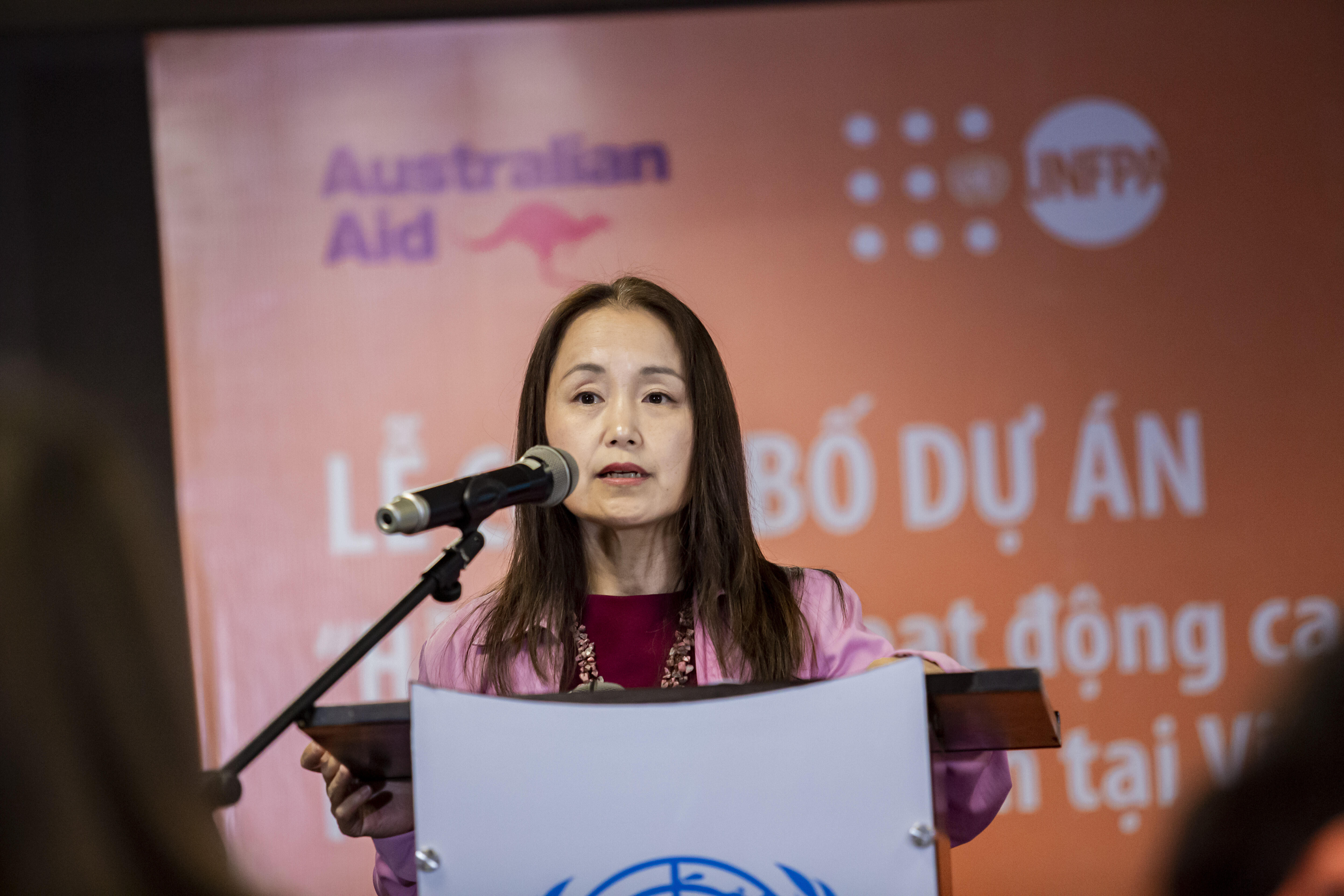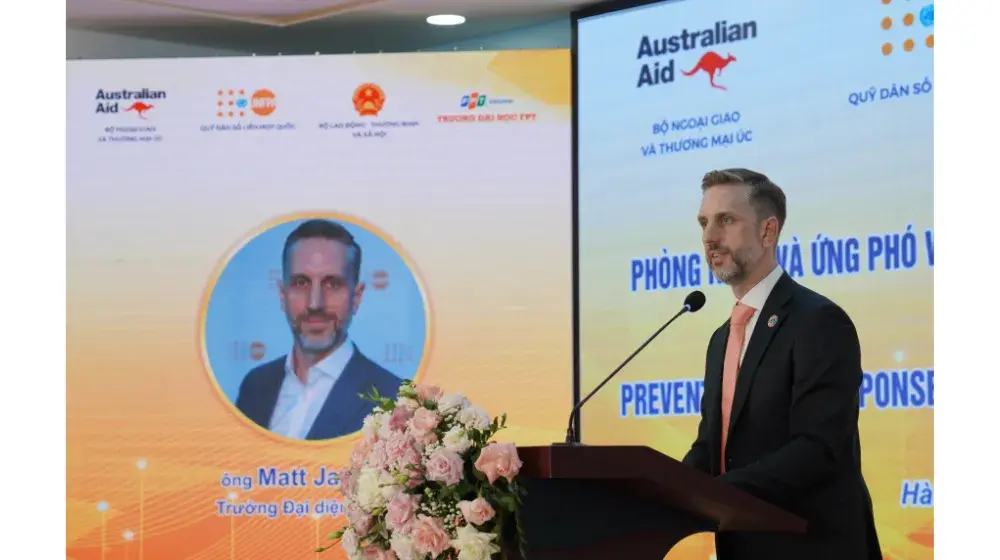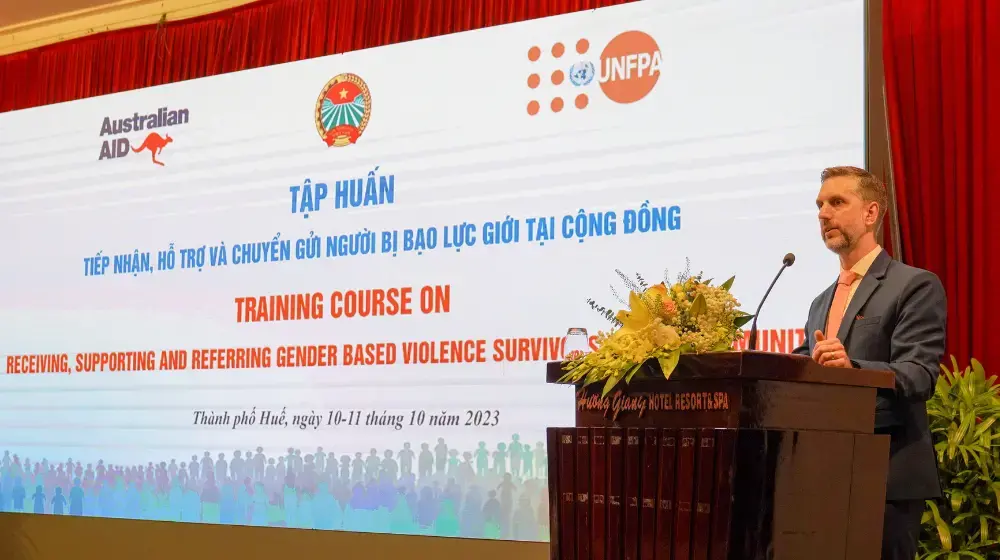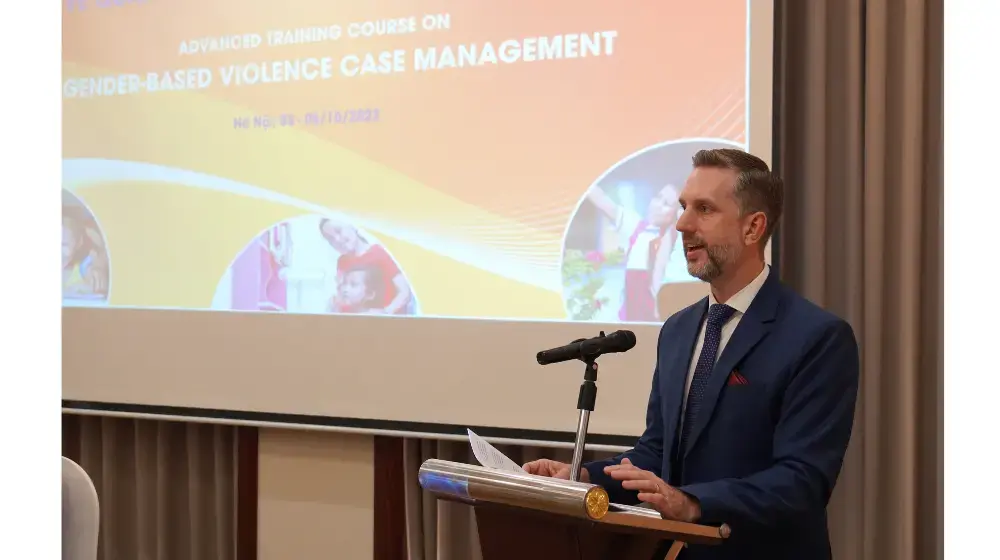Honorable Vice Minister of Labour, Invalids and Social Affairs, Madame Nguyen Thi Ha;
Representatives of the Ministry of Labour, Invalids and Social Affairs (MOLISA); Ministry of Culture, Sports and Tourism (MOCST); Ministry of Education and Training (MOET); Viet Nam Women’s Union, and the Center for Studies and Applied Science in Gender, Family, Women and Adolescents (CSAGA).
Excellency, Ms. Robyn Mudie, Australian Ambassador to Viet Nam;
Ms. Rana Flowers, UNICEF Representative;
Ms. Elisa Fernandez, UN Women Representative;
Media colleagues;
On behalf of UNFPA, UNICEF and UN Women in Viet Nam, I am much honored to be here today, for the announcement of the project "Supporting interventions to eliminate violence against women and children in Viet Nam under COVID-19 emergency context".
This is a new project jointly funded by the Australian Government (DFAT) and the UN agencies, and co-implemented by UNFPA, UNICEF and UN Women, and in partnership with MOLISA, MOCST, MOH, MOJ, MPS, MOET, Viet Nam Women’s Union, and CSAGA, for the period from June 2020 to May 2021.
We greatly appreciate the partnership with the Australian Department of Foreign Affairs and Trade to partner with us all, and the commitment of the leaders of MOLISA, and other line ministries and organizations. We look forward to working closely with all of you for the project implementation. Without addressing the issue of violence against women and children, there is no way that the Sustainable Development Goals can be achieved.
Ladies and gentlemen,
Violence against women and children is one of the most pervasive human rights violations that exist in many countries in the world. Violence against women and children may occur in a multitude of different contexts, including home, workplace, public and social spaces. It is estimated that 35.6% of women, globally, have experienced either physical or sexual intimate partner violence, or sexual violence by non-partner, or both at some point in their lives.
Sadly, Viet Nam is no exception.
The National Study on Domestic Violence against Women in Viet Nam, conducted by the General Statistics Office in 2010, showed that 58% of ever-married women had experienced at least one of the three forms of violence (physical, sexual or psychological) in their lifetime.
However, 87% of survivors – that’s almost 9 out of 10 women - did not seek help from any authorities due to lack of available services or because of the fear of stigma, discrimination and further harassment.
Violence against children is widespread in Viet Nam as well. According to the Multiple Indicator Cluster Survey in 2014, around two out of three children aged 1-14 years experienced some forms of violent discipline in the home. In addition, the Government of Viet Nam reports over 2,000 cases of child abuse every year, of which 75% are of sexual abuse. However, that is considered to be only the tip of the iceberg, alluding to a much more complex and widespread reality.
Distinguished guests,
It has been reported that the pre-existing crisis of violence against women and children has been exacerbated in the context of COVID-19 globally, and Viet Nam is following the same trend. Recent reports in relation to COVID-19 have shown that restrictions in movement, social isolation and similar containment measures, coupled with existing or increased social and economic pressures and stress on families, have led to an increase in violence, particularly against women and children. In many countries it is estimated that domestic violence has increased by at least 30%.
In Viet Nam, the Peace House Hotline (a shelter run by the Viet Nam Women’s Union) has received twice as many calls for help over the past months compared to the same months in previous years. The Sunshine Hotline (as supported by UNFPA in Quang Ninh province) also received many calls during social distancing period. It has been reported that risks of physical abuse, sexual abuse and child sexual abuse and exploitation have increased substantially. Schools closure and social distancing measures exposed children to increased isolation and to substantial protection risks, threatening their safety and ultimately – their right to grow up and learn in a safe and protected environment away from harm. Most of the times, perpetrators of violence and abuse are well-known to the child.
Ladies and gentlemen,
Within the current context, the project we are launching today shows a great cooperation between the Government of Australia, the Government of Viet Nam, and the UN agencies in continuing to address the challenges ahead on violence against women and children in Viet Nam.
Ending violence against women and children should be a priority for everyone. It is about making sure that everyone is part of the country’s sustainable development process, leaving no one behind. We trust that this new project will make a great leap forward to eliminate violence against women, girls and boys in Viet Nam.
Thank you very much for your attention and participation.





